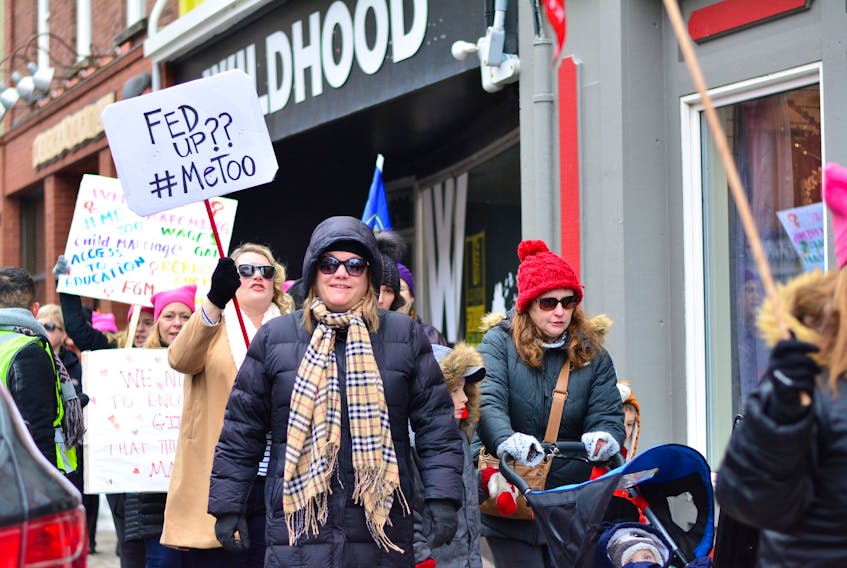“He’s just joking around. He meant no harm. It’s not a big deal. Why do people keep over-reacting?”
Human Rights Commission Executive Director Carey Majid says these are the kinds of statements lawyers have been making to her on the phone in the 10 years she’s been dealing with sexual harassment complaints.
But two weeks ago, she got a different kind of call. She said it was the first time she heard a lawyer on the phone sounding “scared and nervous.”
“I got a call from a senior lawyer here in town. For the first time in 10 years, they were taking it seriously. They knew it was wrong. They knew they had to do something.”
Majid says these kinds of changes are largely a result of last year’s Women’s March and the #MeToo movement.
“I’ve been a feminist activist for over 35 years… we see the incremental stages and then we see a quantum leap, and I think that’s what we’re seeing here now.”
— NDP MHA Gerry Rogers
While last year’s marches saw anti-Trump signs, the focus this year is on local issues and activism. Moreover, people at the rally on Saturday say they are fed up with incremental steps — they want big changes now.
“We are done waiting,” said Federation of Labour president Mary Shortall. “We’re not going to be satisfied any longer with baby steps.”

So, on a cold and overcast Saturday afternoon, more than 100 people left City Hall in St. John’s and marched up Water Street with one overarching goal in mind: to advance the rights of women and vulnerable citizens.
The march was part of a co-ordinated effort across the world, including more than 40 cities in Canada. This second march aims to build on the progress made in 2017.
Local issues focus of St. John’s Women’s March
“It can be tempting to look at our neighbours in the south and feel smug about things being better… we are far from having achieved equality,” said Shortall. “We continue to have a stubbornly high gender wage gap – 69 cents here in Newfoundland and Labrador.”
That means if a man and woman both work a 9-5 job this year, the woman will essentially work for free from Aug. 28 onwards.
Shortall also points to the thousands of women and children who sleep in shelters every year because it’s not safe to sleep at home, noting that Newfoundland and Labrador has one of the highest rates of domestic violence in the country — and the provincial rate is rising.

The number of changes protesters seek in order to achieve equality is staggering; they range from eliminating the gender pay gap to eradicating gender-based violence.
But NDP MHA Gerry Rogers points to some recent progress, such as the five women elected to St. John’s City Council. Rogers says recent movements, such as the Women’s March, are creating “cataclysmic change”.
“I’ve been a feminist activist for over 35 years… we see the incremental stages and then we see a quantum leap, and I think that’s what we’re seeing here now.”
However, like other voices at the march on Saturday, Rogers has a list of changes that she believes still need to be made, such as access to affordable child care.
“That’s a foundational piece for women to be able to fully participate in the workplace — to fully have equality — and the fact that we don’t have that is wild,” she said.
“We should continue to keep protesting and gathering … until we don’t have to anymore; until women get the same pay, and women aren’t vulnerable when they walk down the street, and Indigenous women aren’t disappeared off the map.”
–Jan Morrison, North West River march organizer
St. John’s organizer Deenaree Voelker said her involvement in the march is not characteristic. She said she’s never really spoken up, even for herself. But last year’s march was a moment of change for her, and that sentiment is one that was echoed by several protesters.
“Opening up some much-needed and often uncomfortable conversations is what I hope this march accomplishes,” she said.
Protesters issued a challenge to governments, community leaders, unions, employers, and individuals to do better.
“And we are a powerful force,” said Shortall.
Women's March in North West River, Labrador
North West River, in central Labrador, has a population of about 550 people. Eighteen of them snowshoed, skied, and walked on the beach during their Women’s March.
Organizer Jan Morrison is a psychotherapist who works with youth. She says she planned the march largely because of what she sees young women experience in her community.
“There’s a huge number of Indigenous youth in my area and there’s a lot of exploitation of them,” she said. “There’s a high rate of suicide, a high rate of diseases, both mental and physical, that arise from oppression, and you can’t take the women’s movement out of that. We’re not OK until everybody’s OK.”
Morrison said people should continue to keep protesting until it’s no longer needed: “Until women get the same pay, and women aren’t vulnerable when they walk down the street, and Indigenous women aren’t disappeared off the map.”
Lorraine Rekmans, Green Party of Canada Critic for Indigenous Affairs, says the movement is truly supportive of all struggles for justice.
“As an Indigenous woman, I am encouraged to see the level of cross-movement solidarity being expressed through these marches, promoting our unified commitment to women’s rights.”









